
Survey on the identity and political orientation of Bitcoiners in the USA
With the results of a survey of more than 3,500 US adults, The Nakamoto Project attempts to respond to the polarized political discourse surrounding the political orientation of Bitcoiners and provide a basis for the corresponding assessments. It found that while Bitcoin owners in the US tend to be younger and male, they do not differ greatly from other Americans politically, demographically or morally. It is also noticeable that those who have dealt intensively with Bitcoin usually have a positive attitude towards Bitcoin and therefore also own Bitcoin.
The Nakamoto Project
The Nakamoto Project has set itself the goal of helping the world understand Bitcoin by collecting data and thus creating a basis for discourse. The project is led by advertising expert Colin Brown and supported by philosopher and Bitcoin activist Troy Cross and researcher Andrew Perkins. The data will be updated every quarter.
In order to identify the main factors that lead to someone owning and using Bitcoin, the Nakamoto project, in cooperation with the software and data collection company Qualtrics, initially surveyed a total of 3538 adults (around 53% of whom were women). They were selected to be representative of the US population and had to answer questions about Bitcoin and their political orientation, values and moral position. Most participants took part in the survey in November 2023. Approximately one seventh of the participants were surveyed in March 2024 - i.e. after the launch of Bitcoin ETFs in January 2024.
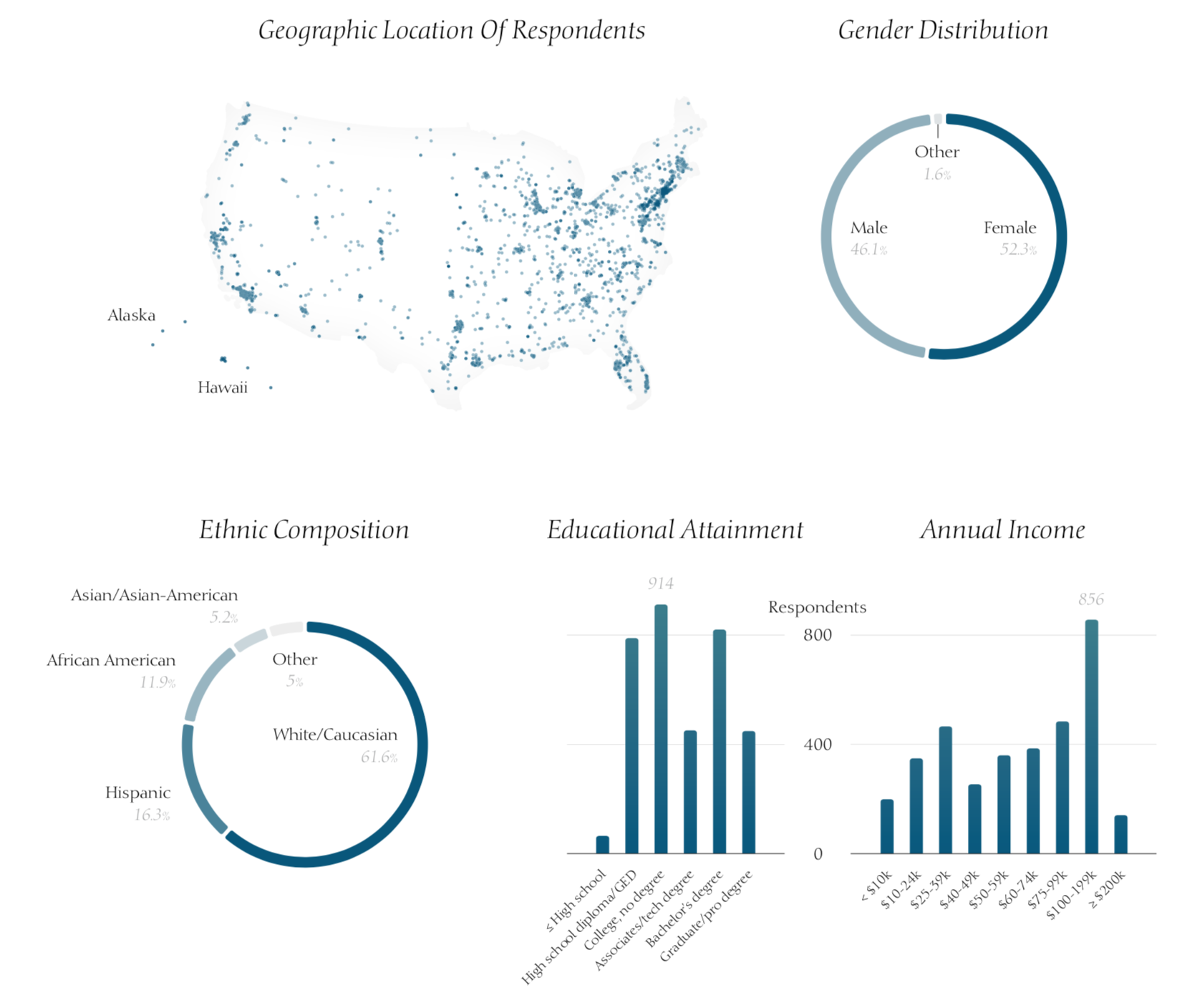
The results of the survey have now been published in the report "Understanding Bitcoin Adoption in the United States: Politics, Demographics, & Sentiment".
Demography
The survey shows that US Bitcoin holders are very diverse. In terms of ethnicity, religion, relationship status, income, education and financial knowledge, there are no significant differences between Bitcoiners and non-Bitcoiners in the US.
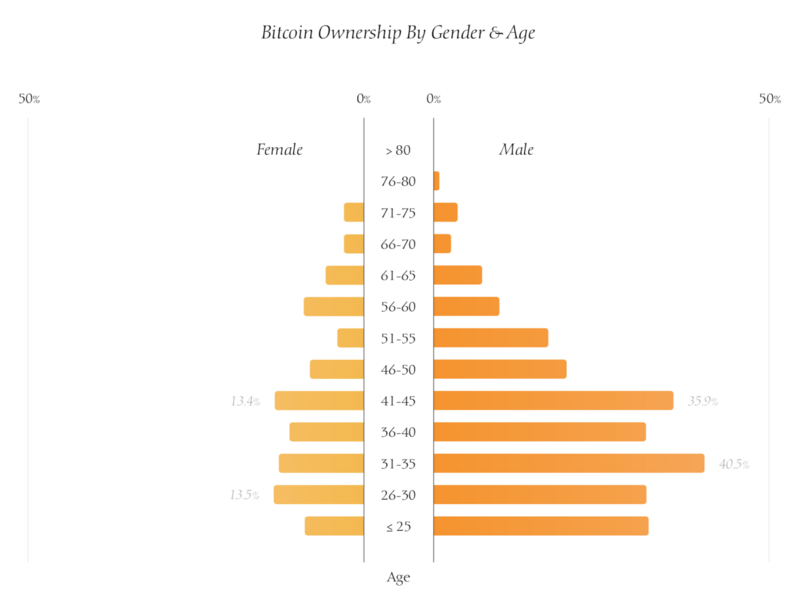
Demographically, the two groups are similar in most respects, but they differ in terms of age and gender: Bitcoin owners tend to be younger and male.
Excerpt from the report
Bitcoin owners, for example, include 40.5 percent of 31- to 35-year-old men and 35.9 percent of 41- to 45-year-old men, compared to just 13.4 percent of 41- to 45-year-old women.
Political attitude
As Bitcoin has been increasingly criticized by the political left and often defended by the political right in recent years, not only in the USA, the impression has arisen that Bitcoin is a right-wing phenomenon. Accordingly, Cross and Perkins actually expected that Republicans and people who describe themselves as conservative would be more likely to own Bitcoin. However, the answers to the specific questions on political orientation in the survey show "that owning Bitcoin is not related to political identity".
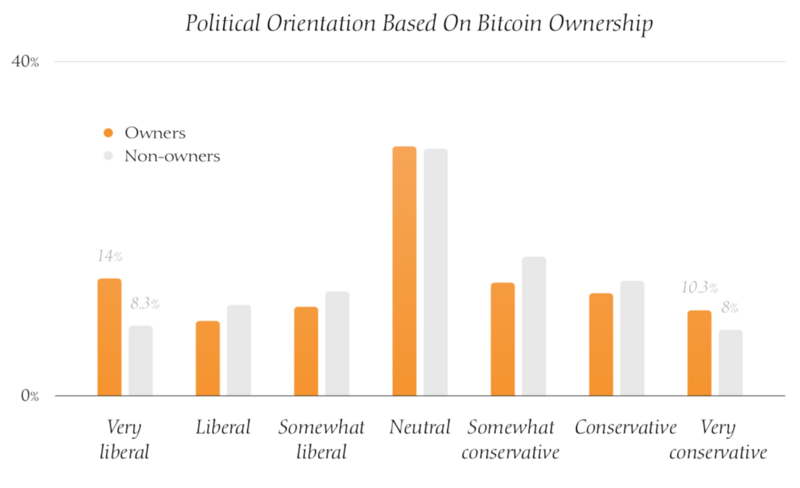
US Bitcoiners can be found across the political spectrum and usually place themselves in the center. The only minor difference between Bitcoin owners and non-owners is the extent to which they hold extreme views: 14 percent of Bitcoiners describe themselves as "very liberal" and 10.3 percent as "very conservative", while among non-Bitcoiners only 8.3 percent are "very liberal" and 8 percent "very conservative". The term "libertarian" is also said to apply to only 3 percent of US Bitcoin owners.
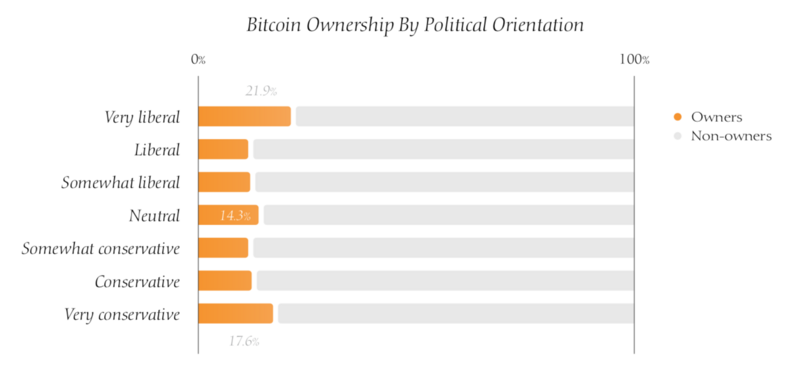
The study also investigated whether certain political groups hold Bitcoin more frequently than others. Surprisingly, it was found that 21.9 percent of respondents who classified themselves as "very liberal" own Bitcoin, followed by 17.6 percent of "very conservative" and 14.3 percent of "neutral" respondents.
In summary, a discourse among politicians, media elites, and social media users that politicizes Bitcoin ownership is highly misleading. The distribution of Bitcoin-owning Americans across political categories looks very similar to the political distribution of all Americans across these categories. Bitcoin ownership is apolitical.
Excerpt from the report
Moral foundations
Another section of the survey was designed to answer the question of whether Bitcoiners are more like liberals or conservatives in terms of their moral foundations. To do this, the survey is guided by Moral Foundations Theory, which contrasts certain attributes, such as care/harm, equality/proportionality, loyalty/betrayal, authority/submission, sanctity/degradation, and freedom/oppression.
The authors note that while there are the typical differences between liberal and conservative views, these differences are not very great. Bitcoin owners would also largely resemble the rest of the US population, although they have a unique profile according to the findings: Cultural freedom and equality rank higher for them than for conservatives or liberals; otherwise, Bitcoiners mostly align with or fall in between conservative (sanctity, loyalty, proportionality) or liberal (caring) views (economic freedom and oppression), so Bitcoiners represent a good mix of both political leanings.
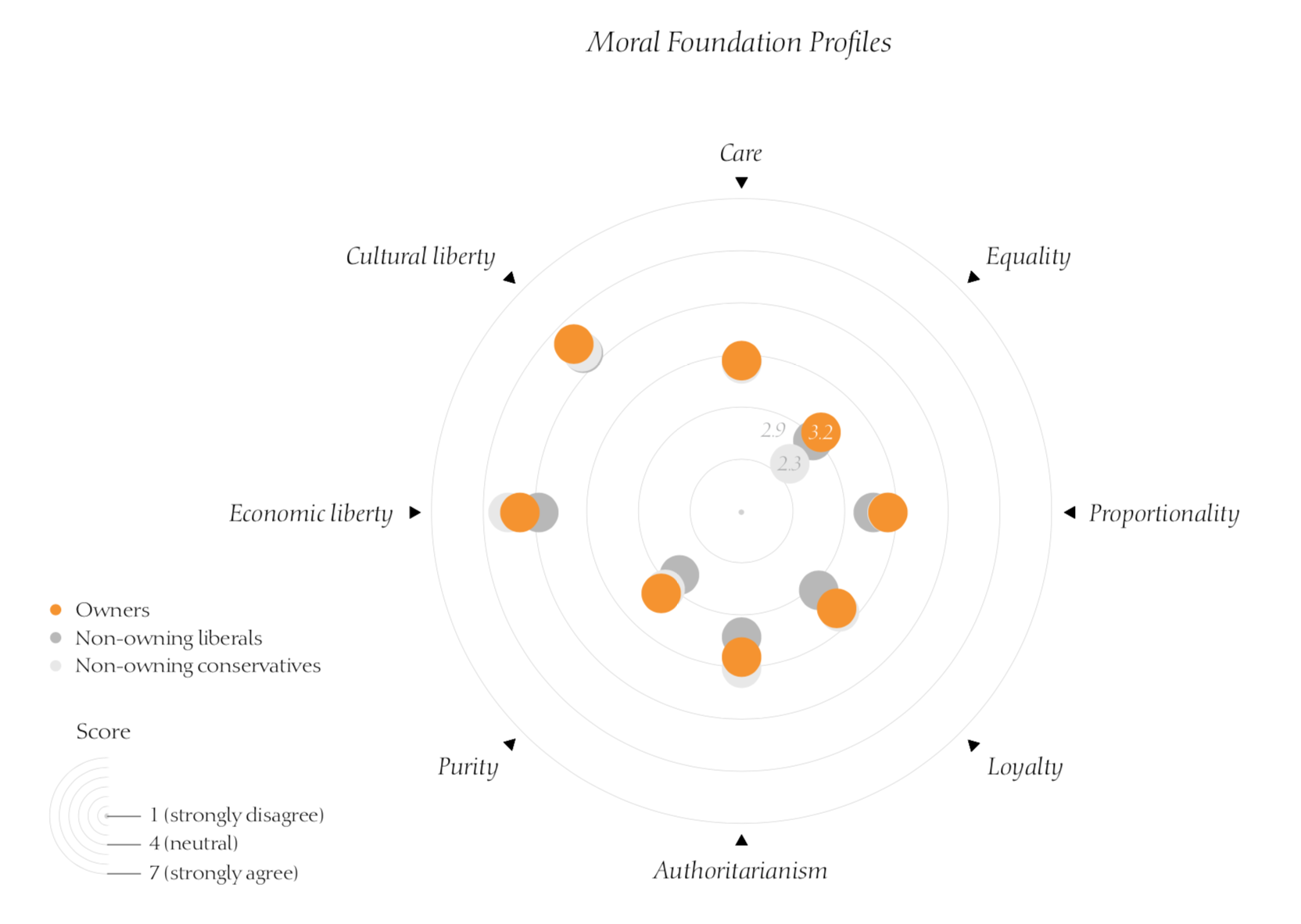
Bitcoin owners in the USA
The survey makes it clear that demographic data and political and moral attitudes do not correlate strongly with Bitcoin ownership.
However, another section of the survey, in which participants were asked about their opinion of Bitcoin (knowledge, trust, belief, morality), shows that this opinion is a key difference between Bitcoiners and non-Bitcoiners.
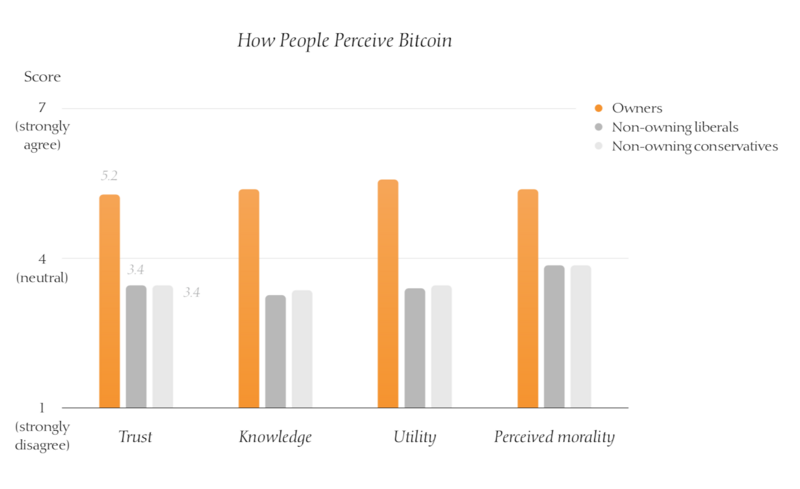
Those who engage intensively with Bitcoin, trust the technology, believe in the benefits of Bitcoin for society and see it as morally good are more likely to be Bitcoin owners than non-owners.
While non-Bitcoin owners of all political persuasions tended to rate each of these factors slightly negatively, Bitcoin owners tended to rate all factors strongly positively.
Excerpt from the report
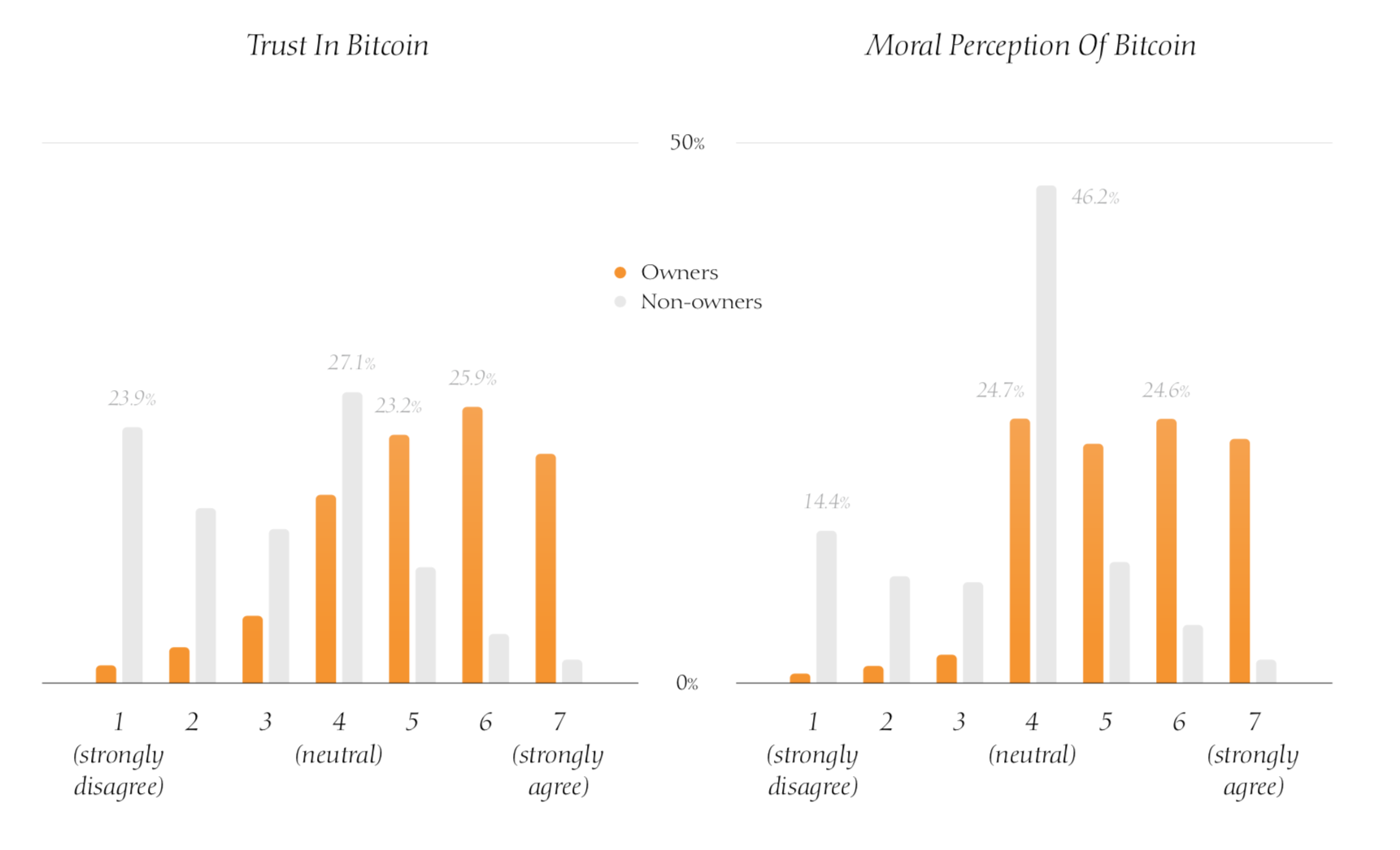
The responses of non-Bitcoiners - whether conservative or liberal - in terms of trust and morality are mainly negative, which is a stark contrast to Bitcoiners.
So rather than demographic, political and moral aspects, it is the opinion about Bitcoin that differentiates Bitcoiners from non-Bitcoiners.
The variables that correlated most strongly by far with Bitcoin ownership were: Knowledge of Bitcoin, belief in the utility of Bitcoin, trust in the Bitcoin protocol and asset, and perceived morality of Bitcoin.
Excerpt from the report
The authors try to explain this by saying that having a strong knowledge of Bitcoin also increases trust in the protocol and strengthens belief in the utility and social potential of Bitcoin. This would motivate people to buy Bitcoin. Another possibility is that people initially viewed Bitcoin as an investment or used it to make payments and only then wanted to learn more about it, thereby fostering trust and belief. Although there is no evidence for these explanations, the authors believe in their validity.
Conclusion
The authors' final explanations of the significant differences between Bitcoiners and non-Bitcoiners are easy to understand and also logical. After all, it is rare to find someone who has studied Bitcoin in depth, really understood it and then come to the conclusion that it is morally reprehensible.
Much more interesting, however, is the fact that this survey has created a solid basis for analyzing the acceptance of Bitcoin in the US population for the first time. For the first time, the authors have used data to prove that there are no significant differences between Bitcoiners and non-Bitcoiners in terms of demographic, political and moral aspects. Bitcoiners are not all extremists who want to abolish the state, but cover the entire political spectrum, although most are rather moderate. Similarly, education level and social status are not clear predictors of Bitcoin ownership.
However, there is a tendency for those who are very positive and well-informed about Bitcoin and who own Bitcoin to be predominantly young and male. Accordingly, the data shows that further Bitcoin adoption in the future should be accompanied by the recruitment of women and older people.
Nevertheless, it is of course questionable whether the survey on Bitcoin is so representative, as many Bitcoiners keep a very low profile and may not have declared their holdings. The transferability to other countries can also be questioned. The report already mentions that there are other studies that do not confirm the gender imbalance in other countries, for example.
It can also be criticized that not all values were given in the study and that the raw data is not accessible. Furthermore, the people behind the Nakamoto Project are not exactly independent. Cross, Perkins and Brown want to report positively about Bitcoin and are engaged in corresponding marketing and lobbying activities.
Nevertheless, the project can offer added value, as further data is continuously collected as a basis for discourse and Bitcoin education is further advanced. It remains to be seen whether similar surveys can also promote discourse in Germany.







